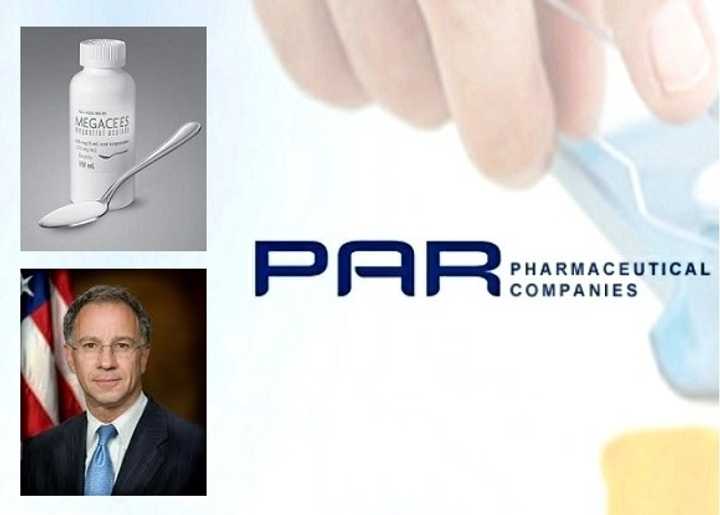CEO Paul V. Campanelli pleaded guilty on behalf of Par before U.S. Magistrate Judge Madeline Cox Arleo, who fined the company $18 million and ordered $4.5 million in criminal forfeiture.
Par also agreed to pay $22.5 million to resolve its civil liability.
“The FDA requires drug makers to go through a stringent approval process before new drugs – or new uses for existing drugs – are made available to doctors and their patients,” said U.S. Attorney Paul J. Fishman (photo, above).
Par “admitted that it chose to ignore that process in pursuit of more sales and greater profits,” Fishman said. “It is paying the price for its choice.”
“Individual accountability of Par’s board and executives is required under the comprehensive five-year integrity agreement OIG has with the company,” said Daniel R. Levinson, Inspector General of the U.S. Department of Health and Human Services.
“For example, company executives may have to forfeit annual bonuses if they or their subordinates engage in significant misconduct, and sales representatives may not be paid incentive compensation for the drug involved in the case, or successor branded versions of that drug,” Levinson said.
Campanelli officially pleaded guilty on behalf of Par to a federal complaint charging the company with a criminal misdemeanor for misbranding Megace® ES in violation of the FDCA.
Megace® ES, a megestrol acetate drug product, was approved by the FDA to treat anorexia, cachexia, or other significant weight loss suffered by patients with AIDS.
The government said it was criminally misbranded because its FDA-approved labeling lacked adequate directions for use in the treatment of non-AIDS-related geriatric wasting, a use that was intended by Par but never approved by the FDA.
The FDCA requires companies such as Par to specify the intended uses of a product in an application to the FDA. Once approved, a drug may not be distributed in interstate commerce for unapproved or “off-label” uses until the company receives FDA approval for the new intended uses.
Federal prosecutors also accused Par of “deliberately and improperly targeted sales to elderly nursing home residents with weight loss, whether or not such patients suffered from AIDS and launched a long-term care sales force to market to this population.
“During this marketing campaign, Par was allegedly aware of adverse side effects associated with the use of megestrol acetate in elderly patients, including an increased risk of deep vein thrombosis, toxic reactions in elderly patients with impaired renal function, and mortality,” Fishman said.
Par “made unsubstantiated and misleading representations about the superiority of Megace® ES over generic megestrol acetate for elderly patients to encourage providers to switch patients from generic megestrol acetate to Megace® ES, despite having conducted no well-controlled studies to support a claim of greater efficacy for Megace® ES,” he added.
(“Except as admitted in the plea agreement, the claims settled by the civil settlement agreement are allegations only, and there has been no determination of liability as to those claims,” the government said.)
In addition to the criminal fine and forfeiture, the plea agreement requires Par to establish several compliance measures and annually provide the U.S. Attorney’s Office with a sworn certification from Campanelli that the company has not unlawfully marketed any of its pharmaceutical products.
Par also agreed to a five-year Corporate Integrity Agreement with the Office of the Inspector General of the Department of Health and Human Services (“HHS-OIG”) that requires enhanced accountability, increased transparency, and wide-ranging monitoring activities conducted by both internal and independent external reviewers.
The plea and integrity agreements also prevent Par from compensating sales representatives or their managers based on the volume sold of Megace ES and any branded successor megestrol acetate drug.
Its executive compensation must also change to allow the company to recoup annual bonuses from covered executives if they, or their subordinates, engage in significant misconduct.
The settlement resolves three lawsuits filed under the whistleblower provisions of the False Claims Act.
Fishman said this brings to an end a multi-year, joint investigation by special agents from HHS-OIG and FDA-OIG, and criminal investigators and paralegals with his office.
He thanked the Defense Criminal Investigative Service; the Office of Personnel Management-Office of Inspector General; the Department of Veterans’ Affairs Office of Inspector General; and TRICARE Program Integrity for assisting in the investigation.
Fishman also gave credit to the National Association of Medicaid Fraud Control Units (NAMFCU), with assistance from the Medicaid Fraud Control Unit of the Ohio Attorney General’s Office for their help in coordinating the settlements with the various states.
Representing the government in the criminal case was Assistant U.S. Attorney Joseph Mack of Fishman’s Health Care and Government Fraud Unit and Special Assistant U.S. Attorney Shannon M. Singleton from the FDA’s Office of Chief Counsel.
Paralegals Jeffrey Skonieczny and Doug Minotti, of Fishman’s office, and Trial Attorney David Frank of the Department of Justice’s Consumer Protection Branch assisted on the criminal side, he said.
The civil settlement was handled by Assistant U.S. Attorney David Dauenheimer and Trial Attorney Eva Gunasekera from the Department of Justice’s Commercial Litigation Branch.
The corporate integrity agreement was negotiated by Christina McGarvey and Gregory Lindquist from the Department of Health and Human Service’s Office of Inspector General.
Fishman reorganized the health care fraud practice at the U.S. Attorney’s Office, including creating the stand-alone Health Care and Government Fraud Unit, which handles both criminal and civil investigations and prosecutions of health care fraud offenses.
Since 2010, his office said, it has recovered more than $500 millionin health care fraud and government fraud settlements, judgments, fines, restitution, and forfeiture under the False Claims Act, the Food, Drug and Cosmetic Act, and other statutes.
Click here to follow Daily Voice Pascack Valley and receive free news updates.
